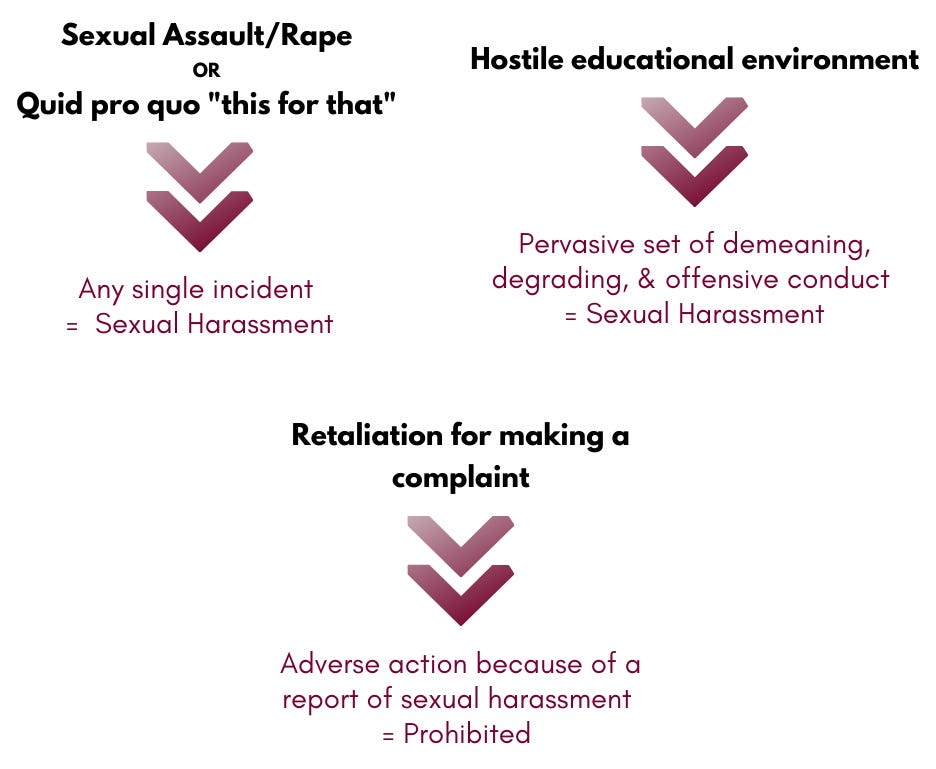Sexual Harassment in Medical Education
4-5 Minute Read
Authors: Judy Hanrahan, JD, MA and Julpohng Vilai, MD
Purpose
Medical educators are responsible for creating a psychologically safe learning environment and for ensuring that students are not harassed, degraded, or treated differently based on sex or gender under Title IX of the Education Amendments of 1972.
Learning Objectives:
1. Recognize the kinds of behavior that constitutes gender-based or sexual harassment; and
2. List the four classes of prohibited acts under Title IX.
When a medical or allied health student, resident, or fellow is rotating with you, your clinic or the hospital is an educational setting analogous to a classroom for the purposes of Title IX of the Education Amendments of 1972 (Title IX). Title IX protects students and employees of educational institutions from exclusion, differential treatment, and discrimination on the basis of sex while participating in educational activities. Students are protected from the acts of staff, faculty, and other students. Prohibited acts under Title IX fall into four categories 1. sexual assault including rape, 2. quid pro quo sexual encounters, 3. creating a hostile educational environment, and 4. retaliation for making a Title IX complaint.(1) Sexual assault including rape and quid pro quo sexual encounters (“let me take you on a date in exchange for a higher grade on test 3”) are per se violations of Title IX meaning that even one instance constitutes sexual harassment. While one instance of derogatory commentary based on sex alone could violate Title IX, the law generally requires a much more pervasive set of demeaning, degrading, and offensive attitudes, behaviors, and commentary.
Faculty are crucial to eliminating, curtailing, and addressing sexual harassment in higher education by both not engaging in sexually harassing behavior towards colleagues and students and by intervening when they become aware of sexual harassment in the educational setting. Faculty are uniquely situated to notice and intervene when sexual harassing behavior occurs in an educational setting and to foster open and safe communication with students providing students with the opportunity to disclose problems.
Every institution of higher education has a Title IX Coordinator responsible for responding to reports of Title IX violations. If you have questions about whether an incident rises to the level of a Title IX violation, need clarification about processes and procedures at your institution, or encounter a student with a concern over sexual harassment, access to educational opportunities based on sex, and/or retaliation talk to your institution’s Title IX Coordinator.
Consider this example
*Jared, a third year medical student, was rotating in my private practice. He’d been a college baseball player and had a muscular physique. A week into Jared’s rotation the receptionist takes a phone call from a patient seeking an appointment, and the patient asks “Is the hot guy still working with Dr. Vilai?”. Apparently, this patient had heard about Jared from a friend we had seen the previous week. After booking the appointment, the receptionist came back to the physician/nurse work station and regaled everyone with the story. She and the nursing staff proceeded to joke and make comments teasing Jared about how “sexy” he was. The banter was all in good fun and I did not think much about it in the moment until I saw the students face. Jared seemed a bit uncomfortable so I took him with me to see patients and we continued our day.
That night I kept thinking about how I handled the situation. My team worked really well together and we were often quite jovial. The team members regularly joked around with each other, and they extended that attitude to the student. I always feel like a fun and relaxed environment aids in learning and makes students comfortable asking questions, but this went too far. Maybe I should have reprimanded the receptionist right there? Should I have directly addressed it with the student in the moment, in private later, or just let it pass?
In an effort to not make Jared more uncomfortable by bringing it up again, I decided to let the moment pass. But I did follow up with the clinic administrator who remediated the receptionist.
How would you have handled this situation? ■
References
1. Title IX of the Education Amendments of 1972. 20 U.S.C. §1681-§1688
*The names and specifics have been changed to protect privacy.


